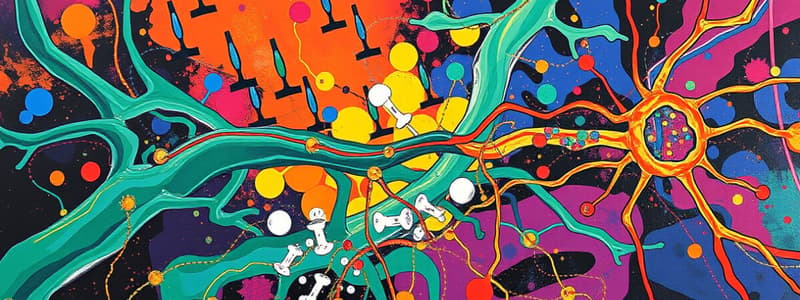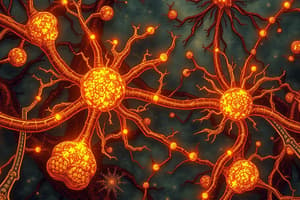Podcast
Questions and Answers
What is the first step in the process of chemical synaptic transmission?
What is the first step in the process of chemical synaptic transmission?
- Neurotransmitter synthesis (correct)
- Removal of neurotransmitter from synaptic cleft
- Vesicles fuse to presynaptic terminal due to Ca2+
- Binds to postsynaptic receptors
Which step directly involves the neurotransmitter interacting with the postsynaptic neuron?
Which step directly involves the neurotransmitter interacting with the postsynaptic neuron?
- Vesicles fuse to presynaptic terminal due to Ca2+
- Load neurotransmitter into synaptic vesicles
- Biochemical/electrical response elicited in postsynaptic cell
- Neurotransmitter spills into synaptic cleft (correct)
What role does Ca2+ play in the process of chemical synaptic transmission?
What role does Ca2+ play in the process of chemical synaptic transmission?
- It facilitates the removal of neurotransmitter from synaptic cleft
- It binds to postsynaptic receptors
- It triggers vesicles to fuse to the presynaptic terminal (correct)
- It initiates neurotransmitter synthesis
What happens after the neurotransmitter binds to postsynaptic receptors?
What happens after the neurotransmitter binds to postsynaptic receptors?
What is the final step in the chemical synaptic transmission process?
What is the final step in the chemical synaptic transmission process?
What is the primary process through which neurons consider multiple synaptic potentials?
What is the primary process through which neurons consider multiple synaptic potentials?
Which factor influences the strength of synaptic integration in postsynaptic neurons?
Which factor influences the strength of synaptic integration in postsynaptic neurons?
What does quantal analysis measure in synaptic transmission?
What does quantal analysis measure in synaptic transmission?
What is the outcome of releasing one synaptic vesicle?
What is the outcome of releasing one synaptic vesicle?
How many vesicles typically release at the neuromuscular junction to achieve a significant EPSP?
How many vesicles typically release at the neuromuscular junction to achieve a significant EPSP?
What is a common effect of activating autoreceptors in presynaptic terminals?
What is a common effect of activating autoreceptors in presynaptic terminals?
How do G protein-coupled receptors influence post-synaptic neurons?
How do G protein-coupled receptors influence post-synaptic neurons?
What does reuptake refer to in the context of neurotransmitter clearance?
What does reuptake refer to in the context of neurotransmitter clearance?
What class of drugs are selective serotonin reuptake inhibitors (SSRIs) considered?
What class of drugs are selective serotonin reuptake inhibitors (SSRIs) considered?
Which of the following is an example of a receptor antagonist?
Which of the following is an example of a receptor antagonist?
What role do autoreceptors primarily serve in the nervous system?
What role do autoreceptors primarily serve in the nervous system?
Which of the following processes leads to the inactivation of acetylcholine?
Which of the following processes leads to the inactivation of acetylcholine?
What aspect of neuropharmacology involves drugs that mimic neurotransmitter actions?
What aspect of neuropharmacology involves drugs that mimic neurotransmitter actions?
What is the primary role of synaptic integration in neurons?
What is the primary role of synaptic integration in neurons?
What differentiates spatial summation from temporal summation?
What differentiates spatial summation from temporal summation?
How do dendrites contribute to synaptic integration?
How do dendrites contribute to synaptic integration?
What happens to membrane depolarization as it travels along a dendrite?
What happens to membrane depolarization as it travels along a dendrite?
What is the primary function of inhibitory synapses?
What is the primary function of inhibitory synapses?
How do dendritic sodium channels behave in certain cells?
How do dendritic sodium channels behave in certain cells?
What is the significance of the dendritic length constant (l)?
What is the significance of the dendritic length constant (l)?
Which of the following is true regarding the relationship between excitatory and inhibitory synapses?
Which of the following is true regarding the relationship between excitatory and inhibitory synapses?
What is the primary function of synapses in the nervous system?
What is the primary function of synapses in the nervous system?
Which type of synapse is characterized by fast and often bidirectional communication?
Which type of synapse is characterized by fast and often bidirectional communication?
What anatomical feature separates the pre and post-synaptic neurons at a chemical synapse?
What anatomical feature separates the pre and post-synaptic neurons at a chemical synapse?
What term is used to describe the connections between the cytoplasm of one neuron and another in an electrical synapse?
What term is used to describe the connections between the cytoplasm of one neuron and another in an electrical synapse?
What aspect of neurotransmitter release at a chemical synapse is crucial for converting chemical messages to electrical messages?
What aspect of neurotransmitter release at a chemical synapse is crucial for converting chemical messages to electrical messages?
What type of synaptic connection involves the axon terminating on the cell body of another neuron?
What type of synaptic connection involves the axon terminating on the cell body of another neuron?
Charles Sherrington is known for coining which term related to neuron communication?
Charles Sherrington is known for coining which term related to neuron communication?
What was the significant finding of Otto Loewi in 1921 regarding synaptic transmission?
What was the significant finding of Otto Loewi in 1921 regarding synaptic transmission?
Which type of synaptic connection is made between axons and axons?
Which type of synaptic connection is made between axons and axons?
What role do postsynaptic potentials (PSPs) play in synaptic transmission?
What role do postsynaptic potentials (PSPs) play in synaptic transmission?
Which of the following is a defining characteristic of chemical synapses?
Which of the following is a defining characteristic of chemical synapses?
What experimental model contributed significantly to our understanding of chemical synaptic transmission?
What experimental model contributed significantly to our understanding of chemical synaptic transmission?
What is the general direction of information flow in synapses?
What is the general direction of information flow in synapses?
What is the main functional difference between electrical and chemical synapses?
What is the main functional difference between electrical and chemical synapses?
Flashcards are hidden until you start studying
Study Notes
Synaptic Transmission Overview
- Synapses serve as crucial points for information transfer between neurons, resembling a service network for communication.
- Charles Sherrington named "synapse" in 1897, illustrating its foundational importance in nervous system operations.
Types of Synapses
- Chemical Synapses: Most prevalent type, involves neurotransmitter release across the synaptic cleft, converting chemical messages into electrical signals.
- Electrical Synapses: Fast and often bidirectional, facilitated by gap junctions that connect neuronal cell membranes, allowing direct ion flow.
Synapse Directionality
- Signal flow generally occurs in one direction: from presynaptic neuron (sender) to postsynaptic neuron (receiver).
- Anatomical connections include axodendritic, axosomatic, axoaxonic, axospinous, and dendrodendritic synapses.
Steps of Chemical Synaptic Transmission
- Neurotransmitter synthesis occurs within the presynaptic neuron.
- Neurotransmitters are loaded into synaptic vesicles which fuse with the presynaptic membrane in response to calcium influx.
- Neurotransmitters are released into the synaptic cleft and bind to postsynaptic receptors, triggering a biochemical or electrical response.
- Final steps involve neurotransmitter clearance via diffusion, reuptake, enzymatic degradation, or desensitization.
Neurotransmitter Effects and Autoreceptors
- G protein-coupled receptors in postsynaptic cells can elicit complex changes associated with learning and memory (neuroplasticity).
- Autoreceptors on presynaptic terminals regulate neurotransmitter release, often functioning as inhibitory feedback mechanisms.
Neurotransmitter Reuptake and Clearance
- Reuptake involves the neurotransmitter re-entering the presynaptic terminal, while enzymatic destruction (e.g., acetylcholinesterase) renders it inactive.
- Pharmacological manipulation of timing for neurotransmitter reuptake plays a role in treating various medical conditions (e.g., SSRIs).
Synaptic Integration
- Summation of multiple synaptic potentials occurs within postsynaptic neurons, allowing cumulative input effects to be considered.
- Most CNS neurons receive thousands of inputs, employing a "weighted voting" system for decision-making based on recent synaptic inputs.
Quantitative Aspects of Synaptic Integration
- The amount of neurotransmitter vesicles released defines the mathematical framework of synaptic integration, where multiple small potentials can lead to significant postsynaptic depolarization.
- Quantal release of vesicles correlates with the magnitude of postsynaptic potential (EPSP).
EPSP Summation Techniques
- Spatial Summation: Simultaneous EPSPs from different synaptic inputs.
- Temporal Summation: Rapid successive EPSPs from a single synapse.
Dendrites and Synaptic Integration
- Dendrites facilitate communication of synaptic integration, acting as conduits for electrical signals.
- They exhibit complex structures with channels that can amplify postsynaptic potentials rather than passively transmit them.
Inhibitory Synapses
- Critical to neuronal output regulation, inhibitory synapses drive membrane potential away from the action potential threshold.
- Not all synapses amplify signals; inhibitory ones are vital for maintaining balanced neuronal activity.
Studying That Suits You
Use AI to generate personalized quizzes and flashcards to suit your learning preferences.




